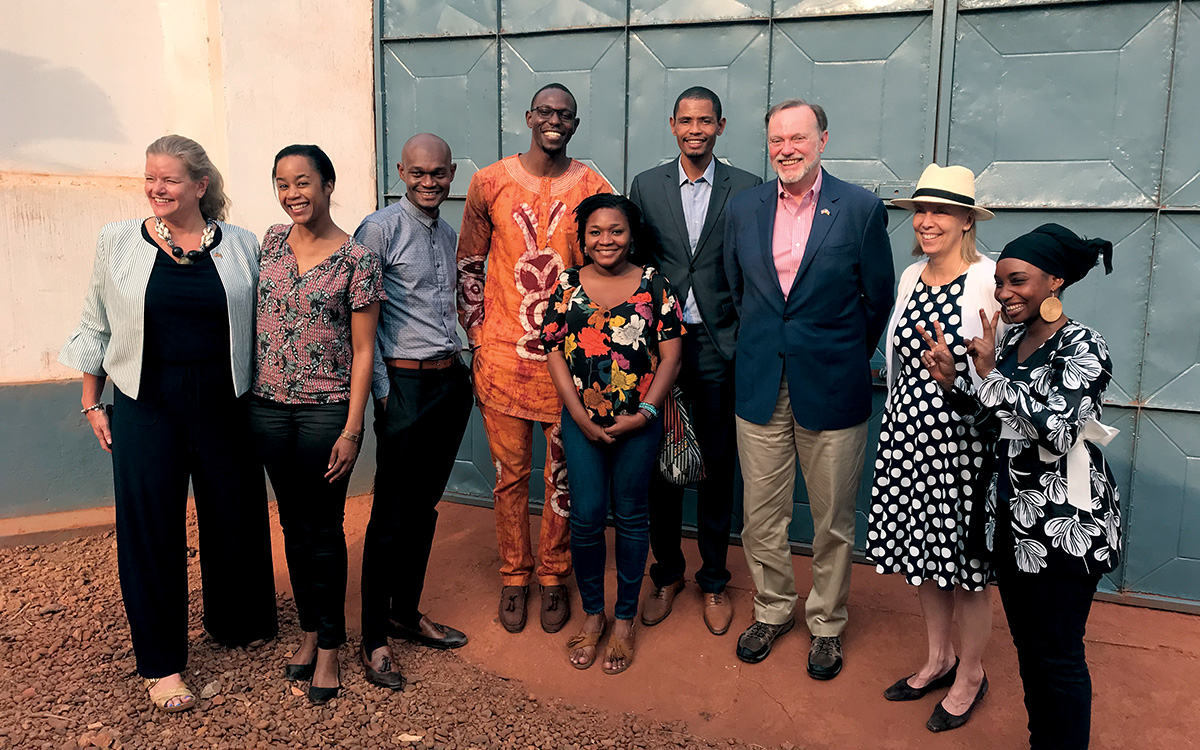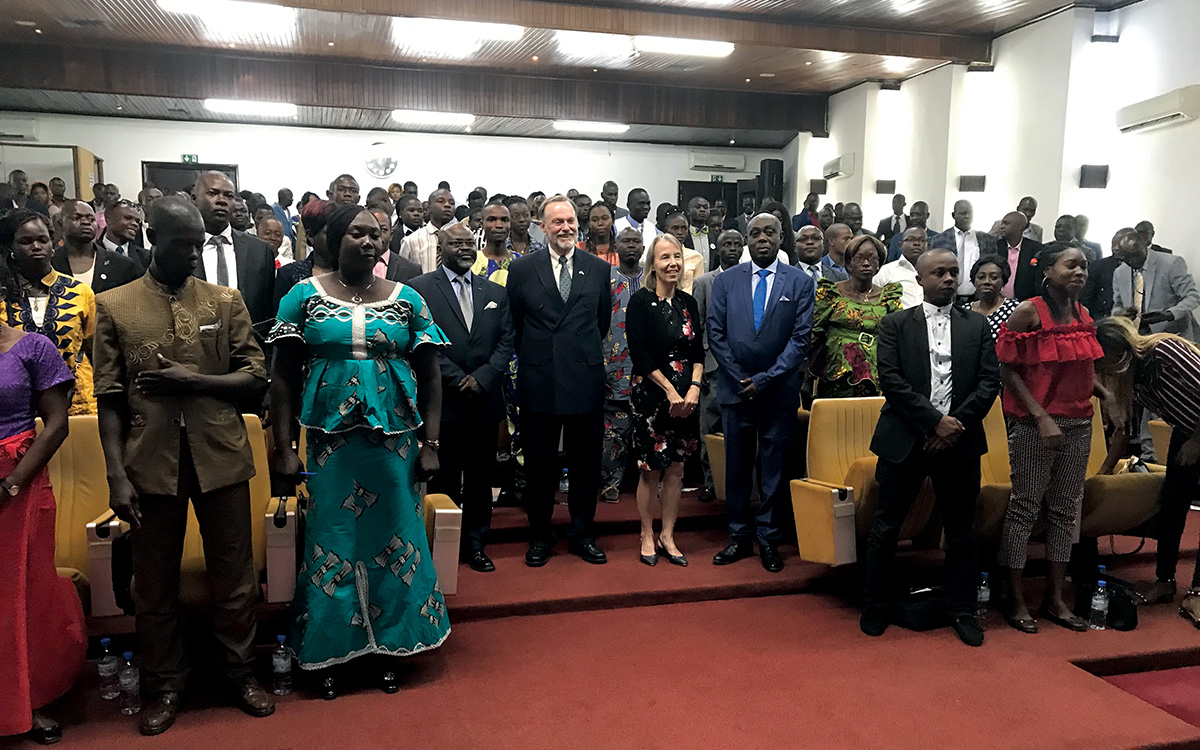A Brighter Future for Africa?
U.S. policy needs to recognize the continent’s tremendous riches in resources and human capacity and help develop their potential to ensure a promising future, this Africa hand explains.
BY TIBOR NAGY

During a visit to the Central African Republic in 2019, Assistant Secretary of State for African Affairs Tibor Nagy met with U.S. embassy leadership and alumni of U.S. exchange programs. From left: Deputy Chief of Mission Pamela Hack; Pascale Gabriella Serra, a Mandela Washington Fellow in the Young African Leaders Initiative; Brice Ekomo, a participant in the International Visitor Leadership Program; Euphrem Moussa, Kessy Ekomo-Soignet and Riva Felix, all Mandela Washington Fellows in the Young African Leaders Initiative; Tibor Nagy; U.S. Ambassador to the Central African Republic Lucy Tamlyn; and Kinanata Sali, with the Regional Leadership Center of the Young African Leaders Initiative.
U.S. Embassy Bangui
In the summer of 2016, then–Assistant Secretary of State for Africa Linda Thomas-Greenfield’s office called me to ask if I would accept a short stint as chargé d’affaires in Abuja, Nigeria, because the post was between ambassadors and needed help preparing for a Secretary of State visit. Even though I had retired in 2003 after a lengthy career in Africa and was then happily ensconced as vice provost at Texas Tech University, one could not say no to LTG.
Little did I realize that those few weeks would lead to my own return to the State Department—this time as assistant secretary—for my second African “adventure.” In Nigeria, I was struck again by the incredibly stark choices facing Africa: either a dystopian disaster of misery, instability, growing extremism, more conflicts and huge migrations; or an invigorated continent bursting with youthful energy, economic promise and greatly improved societies.
The Reality
In the 60-some years since Africa’s decolonization, the continent has always been Washington’s lowest geopolitical priority. In explaining this to my African friends, I use the example of a pick-up basketball game among Olympic athletes—even though they are all Olympians, someone must get picked last. This is reality. Anyone who disagrees needs simply to compare how State resources the Bureau of African Affairs and our embassies in Africa compared to other regions; resources, not statements, reflect priorities. For example, where else would a country of more than 100 million people (Ethiopia) merit only one diplomatic post?
A few other truisms regarding America’s engagement with Africa are:
• Africa has always been seen as a “problem” to be solved, rather than an opportunity to be appreciated; Africa is considered the continent of perpetual bad news.
• In our African policy implementation, there has always been a tension between achieving long-range goals and responding to immediate crises; the reality is that the crises have always sucked the oxygen out of the room.
• While each administration has showcased, often to great fanfare, a “new” Africa policy, they have fundamentally all been the same: to promote a stable, peaceful Africa with improved political, economic and social opportunities for its people. None have succeeded.
• Africa’s colonial masters designed Africa to fail by encumbering it with national borders that made no sense historically, ethnically, commercially or politically—they only met the colonials’ interests. In addition, African states gained independence at a most awkward historical moment—during the Cold War, when they had no choice but to pick a side between the West and the Soviet Empire.
• In the decolonization struggles, the United States invariably supported the losing side—namely, the colonial powers and South Africa’s apartheid regime (until Congress ended “constructive engagement”). This left a bitter taste with the winners that remains even today. Compounding the problem, in the immediate postcolonial period Washington relied on the advice from former colonial powers on how to handle the newly independent states. The colonial powers, of course, were looking after their own interests, and their actions were imbued with racism and paternalism.
• Finally, along with providing generous humanitarian and development assistance, the U.S. has often conducted our engagement with Africa through a megaphone—lecturing, hectoring, advising, but rarely listening.
Contrasting Futures
In Nigeria in 2016, I had an opportunity to experience two diametrically opposing glimpses of Africa’s future.
One day I had a long discussion with the then governor of Borno State, ground zero for the depredations of Boko Haram, the extremist group that has so terrorized Nigeria’s Northeast. Beyond the immediate problems, Governor Ali Modu Sheriff explained that while it is common knowledge that Africa’s population will double between now and 2050 (to 2.5 billion), few realize that much of that growth will take place in the vast Sahel—the harsh zone between fertile plains and the Sahara Desert, stretching from the Atlantic to the Red Sea, an area that includes Borno. The region, which is enflamed by extremist violence, also contains some of Africa’s weakest states, least-educated populations, the greatest poverty with limited economic opportunities and the fewest rights for women. With such characteristics, I could envision an even grimmer future of greater instability, violence and mass migrations.
However, the next day, I had an opportunity to meet with Nigeria’s returning Mandela Fellows, a program under President Barack Obama’s “Young African Leaders Initiative,” which brings some of Africa’s brightest young people to U.S. universities for summer programs. During our discussions, I had an epiphany: Never in my life had I encountered a sharper, more visionary group of young people—these were future leaders sharing similar life goals and dreams as my Texas Tech University honors students, and they were eager to help their countries achieve a much brighter future.
For decades, the U.S. was Africa’s largest trading partner, but this ended in 2009 when China surpassed us with about $200 billion in annual trade.
In my view, the determining factor between the contrasting futures offered by the governor of Borno and the Nigerian Mandela Fellows comes down to Africa’s youth. Will these millions and millions of young people, in countries with low median ages, be a force for instability or dynamic growth? And the answer comes down to this: Will they have economic opportunities (good jobs) and decent governments, or will they be frustrated by the lack of those essentials? Will they be the world’s new consumers or disruptors?
There is no reason Africa’s emerging youth “tsunami” should not have access to great jobs, because Africa’s potential is enormous. Others have recognized this, even if U.S. institutions, including most of our businesses, have continued to focus on Africa’s problems. Already, in the decade before COVID-19, seven of the world’s 20 fastest-growing economies were African; and by 2050 one out of every four workers in the world will be African. But beyond Africa’s population explosion, its major significance to the 21st century will be its prominence in the globe’s transformation to a “green economy.”
Tapping Africa’s Potential
The continent contains some of the world’s largest reserves of rare-earth elements and minerals like copper and bauxite, key components in emergent green tech. For example, while a gasoline-powered car contains about 50 pounds of copper, a fully electric vehicle has 175 pounds, and a wind turbine 4.7 tons. Just one African country, the Democratic Republic of the Congo, contains more than half of the world’s reserves of cobalt, an essential component in batteries and other renewables. Because of its overall mineral wealth, the DRC is referred to as the “Saudi Arabia of the 21st century,” and that’s not an exaggeration. Shortly after coming to power in 2018, DRC President Félix Tshisekedi made it clear that his first preference would be to partner with U.S. companies in developing these resources.
Unless the United States grasps such opportunities quickly, they will pass; others have recognized Africa’s value and are using it to advance their own global aims. For decades, the U.S. was Africa’s largest trading partner, but this ended in 2009 when China surpassed us with about $200 billion in annual trade. Since then China has continued to increase its African engagement economically, culturally and diplomatically, and has included 39 of Africa’s 54 countries in its more-than-trillion-dollar global “Belt and Road Initiative.”
Beyond massive infrastructure and mining deals all over the continent, China excels at something the U.S. does poorly: engaging with African leaders at the highest level. Africans notice that Europeans get calls from the U.S. president or Secretary of State, while their leaders—except in rare circumstances—deal with the assistant secretary or under secretary. U.S. presidential, vice presidential and even Secretary of State visits to the continent are rare, while the highest-level PRC officials visit regularly and often.
When I came back to State and started visiting Africa, I saw in every country how extensive their Chinese connections had become. I quickly conducted a survey with our embassies there to find out how many people we had promoting trade and investment compared to the PRC embassy, and the results were depressing. On average, China’s advantage was 3 to 1 in staffing—and in some missions we had only a part-time diplomat dedicated to trade, who might also have to do visas when the consular officer was unavailable. But at the same time, African leaders were telling me how eager they were for U.S. trade and investment, because they realized that American companies created the types of jobs their countries needed (and this included the autocrats, because they could also see the rising anger in their young people from lack of opportunities).
I stated in many speeches that I couldn’t blame Africans for their deals with the PRC: For years, when they needed help with a project, the only one knocking on the door was Beijing. But, in general, Chinese projects don’t transfer technology, don’t provide local employment (beyond those turning a shovel) and don’t always respect the environment. Often they even bring in vendors from the PRC who replace local small businesses. In addition, given their opacity, deals with Beijing often leave a country with massive debt.

In Bangui in 2019, Assistant Secretary Tibor Nagy and Ambassador Lucy Tamlyn met with students at the Presidency. At center, from left: Central African Republic Minister of Higher Education Jean-Laurent Syssa Magalé (at the time rector of the University of Bangui), Tibor Nagy, Lucy Tamlyn, and University of Bangui Secretary General Dr. Jean Kokoide.
U.S. Embassy Bangui
Preliminary Initiatives
We acted as quickly as possible, introducing the concept of embassy “deal teams,” enlisting every American at every African embassy to support two-way trade and investment initiatives that came their way. First introduced at Embassy Nairobi by then-Ambassador Bob Godec, the concept was then extended continentwide. On the U.S. side, the administration implemented two initiatives. One, Prosper Africa, involved taking a “whole of government” approach to supporting U.S. trade and investment. For decades, while U.S. embassies advised their host countries to set up a “one-stop shop” to promote trade and investment, the U.S. itself never did that.
Prosper Africa did not create a new bureaucracy; instead, it linked together offices in 17 U.S. government agencies that dealt with supporting U.S.-Africa trade and investment in a one-stop-shop digital initiative to promote and support economic engagement in Africa at www.ProsperAfrica.gov. Wisely, the Biden administration has continued this effort and will hopefully expand it.
But the initiative is still in its initial implementation phase, and Congress is considering “Prosper Africa” legislation to give it a firm legal foundation. Three U.S. government agencies—State, Commerce and USAID—were key to Prosper Africa’s conception, and there was considerable discussion as to where the organization should reside. For now, the secretariat is located in USAID, but it needs an independent home to become truly effective.
Second, we needed a way to provide flexible financing for U.S. companies willing to undertake projects in Africa if they were to be able to compete with PRC (and other) proposals. The administration was able to transform the Overseas Private Investment Corporation into the International Development Finance Corporation, double its capitalization to $60 billion and give it greater flexibility.
But these initiatives are just a start, and China is not the only country seeking to expand its influence in Africa. In recent years Russia has been working hard to regain the influence it had during Soviet days. But without the Soviet Union’s heft and resources, Russia is limited to being opportunistic; it is focused on poking the U.S. and our Western allies in the eye where it can. Russia even fields mercenaries with close ties to Putin. One such, the Wagner Group, has been active in a number of African nations that suffer from instability; but instead of helping, they compound human rights violations and steal mineral riches. Beyond China and Russia, other major players—notably Turkey, the Gulf Arab states, Israel, India, the U.K. and the European Union—have all recognized Africa’s importance and are actively pursuing their own commercial, diplomatic and strategic interests.
There is no reason Africa’s emerging youth “tsunami” should not have access to great jobs, because Africa’s potential is enormous.
Despite our benign neglect and historical missteps, Africans are eager to make us their preferred partner because we remain best positioned to help Africa achieve a promising future. We possess many attributes that appeal to Africans, especially the youth. American entrepreneurship, technology, culture and, most especially, values are all highly esteemed. And Africans greatly appreciate two monumental U.S. presidential initiatives: Bill Clinton’s African Growth and Opportunity Act (AGOA), allowing for the duty-free entry of African goods; and George W. Bush’s President’s Emergency Plan for AIDS Relief (PEPFAR), dramatically increasing the number of Africans being treated for HIV/AIDS. President Obama’s Young African Leaders Initiative (YALI) has also made a major positive impact. Beyond bringing Mandela Fellows to the United States, the YALI network—an online community of young Africans communicating with and supporting each other—is now at 700,000 members and growing.
But Africa needs jobs now. An indication of the continent’s overall fragility is the metastasizing of extremist violence, which is expanding its scope from long-troubled areas to affect every region of Africa. And while international coalitions are actively confronting the extremists, they cannot be defeated by military means alone. Eliminating one group, without filling the vacuum with government services and economic opportunities, simply results in the emergence of a new group, more extreme and violent than the previous.
At the Crossroads
This is why Africa’s leaders desperately seek the types of investments the U.S. (and other Western companies) can bring. However, since U.S. presidents, unlike China’s, cannot order American companies to invest in this or that country, African nations that seriously want to attract U.S. investment have to do their part. This means implementing major and difficult changes: addressing corruption, establishing a “level playing field,” improving the judicial system, improving governance, improving commercial factors (e.g., fair taxes, employment rules, property laws), improving human rights, and so on.
This is how the United States can help Africa achieve the more promising future. On the U.S. side, build on Prosper Africa to implement a truly whole-of-government mechanism to effectively support U.S. companies wanting to trade or invest in Africa. This would be especially useful to small and medium-sized U.S. companies that may be eager to invest but need hand-holding. On the African side, engage seriously with African governments that genuinely want to improve their local environments to attract investors who create jobs. In each case, this would require serious public-private partnerships and working with like-minded international donors, but it is very doable.
And most importantly, we need to do much more with Africa’s youth, since in the end they are the solution. This means going beyond YALI to much more ambitious programs.
For example, during my time at State, we tried to create a U.S.-Africa University Partnership Initiative to establish long-term, comprehensive partnerships between U.S. and African institutions to benefit both sides. The “big idea” was to help Africa establish the types of universities that could become instruments of national development, as ours have, and produce graduates their economies need. The plan was for student, faculty and research exchanges; dual degree programs; training on how to partner with the private sector; and effective university administration. Our experimental model was highly successful: with $3 million we funded 10 projects in seven countries involving 75 universities (11 U.S. and 64 African). The U.S. university community was highly enthusiastic, but our proposal went nowhere.
In February 2020, we organized a widely attended conference at the State Department with representation from numerous U.S. and African institutions. Unfortunately, dealing with the COVID-19 pandemic became an all-consuming priority within weeks after the conference, and our initiative did not expand further. This would seem like an obvious program for the Biden administration to expand, especially given the increasing competition with China over which country’s global vision Africa’s youth will favor.
Regarding Africa, we truly are at the crossroads. Doing what we have always done will leave Africa vulnerable to the dystopian future portrayed by the governor of Borno. On the other hand, recognizing Africa’s tremendous riches in resources and human capacity and helping develop their potential can lead to the dynamic future exemplified by the Mandela Fellows.
One of the first things I did when coming back to State was to articulate a new slogan for the Bureau of African Affairs: “Look at Africa through the windshield, not the rearview mirror!” And that is exactly where U.S. policy needs to be.
Read More...
- “China’s Presence in Africa Is at Heart Political” by Thierry Pairault, The Diplomat, August 2021
- “One Story, Two Events, Seven Leadership Lessons” by Prudence Bushnell, The Foreign Service Journal, January-February 2017
- “Africa Can Make it, and We Should Help” by Tibor Nagy, The Foreign Service Journal, May 2004





